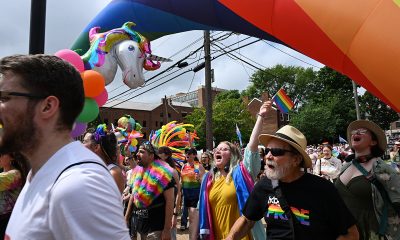Local
Back to school: How campus life got better
Reflections on change as the class of 1974 meets the class of 2014 at UVA
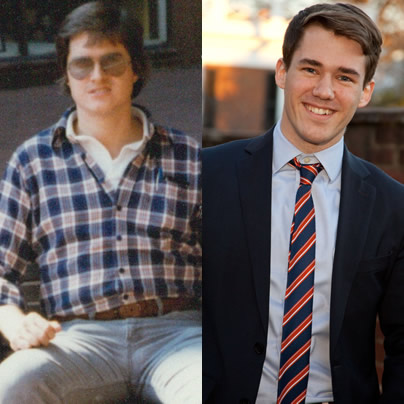
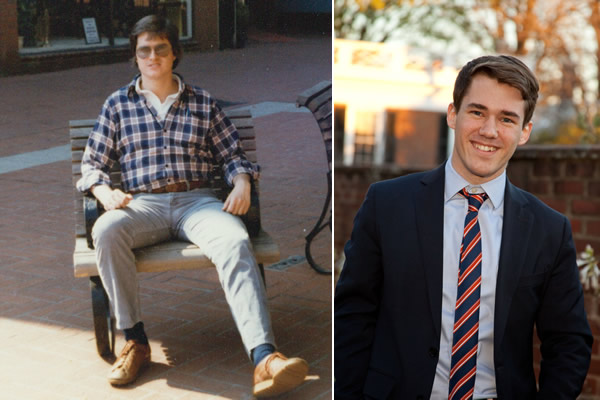
Bob Witeck (left), who graduated from the University of Virginia in 1974, shown here in Charlottesville. Brendan Maupin Wynn, class of 2014, at UVA’s Serpentine Wall on campus. (Photos courtesy of Witeck and Wynn)
Editor’s note: This is the first installment in a series assessing the LGBT climate on university campuses as told by alumni we’re pairing with current students to tell their stories. This week: Bob Witeck and the University of Virginia. Next in the series: Jeff Trammell returns to William and Mary as rector.
In 1973, Bette Midler flounced out of the Continental Baths in Manhattan to record the chart-topping gay anthem, “You Gotta Have Friends,” but for Bob Witeck, it didn’t come with an instruction manual. With nary a hint of gay life on the campus of the University of Virginia, he sought help in the library.
“There were maybe 10 titles, each of them clinical or scary,” Witeck recalled. “None gave me a sense of hope, promise or acceptance in any way.” So, he buried himself in his studies, anti-war activism and marathon bridge tournaments. He could declare and partner in bridge, but seeking one in life was too risky. Jesse Helms and Anita Bryant were hunting and killing gay civil rights wherever they could. Witeck is from an entire generation of “Friends of Dorothy” — and the gay, straight-A student was asexual.
Such was the state of gay life on America’s college campuses for many closeted students 40 years ago.
Today, brimming with hope, promise and acceptance, Brendan Maupin Wynn walks the same UVA campus that Witeck did four decades earlier — only he’s running for office, signing petitions for any number of progressive causes, and when the mood strikes him, he takes a man on a date.
“I only worry whether my date has a winning smile — never how we’ll be treated at an event,” he says. This straight-A student is gay and makes no apologies for it.
When he learned of this project for the Washington Blade and that he was being paired with Bob Witeck, Wynn responded, “Is this the Bob Witeck who’s the Washington PR magician?” The answer is yes, Brendan, and that magician did a disappearing act when he was in your shoes. Contrasting the two Cavs is the goal of this column and that progress is nothing about which to be cavalier.
LGBT rights advances can be attributed to the work of many straight allies and gay heroes — and on the UVA Grounds, to the Serpentine Society, where LGBT alumni provide straight talk beside the legendary curvy serpentine wall invented by Thomas Jefferson. The Serpentine Society was conceived in 1998 and is dedicated to advocating for LGBT alumni, faculty and students.
It’s simultaneously no one’s fault — and everyone’s — that LGBT students had to live in a quiet isolated closet over much of history. Queers have been in quads since the first Corinthian column was erected on a campus. Today they’re out in the sunshine sitting against that same column.
Who to thank for all this progress? Witeck’s gay heroes are pre-Stonewall: Frank Kameny, Barbara Gittings and Lilli Vincenz. His straight heroes are Rep. John Lewis (D- Ga.) and Julian Bond of the NAACP — black leaders who considered us their “gay brothers and sisters” even before President Obama gave an inaugural shout-out to those brave enough to be out. Imagine that from Richard Nixon in ’73. Wynn’s straight hero is Hillary Clinton and he talks about the gay-straight village it took to raise him at UVA. While Ellen DeGeneres and Rachel Maddow are high on his list of gay heroes, he need look no further than Peabody Hall on campus to find others.
“I am so lucky to have a ton of gay role models to choose from. Our dean of students, Allen Groves is the coolest guy around. Everyone on Grounds loves him!”
Our long slow march toward this equality is sort of parallel in pop culture to the goofy (and now gay) Gomer Pyle of the ‘60s TV show. The now-out Jim Nabors endured sit-com life in quiet backwards Mayberry RFD. Nabors waited until he was 82 to come out. Wynn? He grew up with Will and Grace. In comparison, his coming out was a piece of cake. Even in rural Tidewater, Va., he was able to come out to his parents and very close friends in 10th grade. He arrived at UVA to find that a freshman’s sexual orientation was indeed part of freshmen orientation.
Witeck waited until he was out of college before pursuing the authentic gay life. That year, Paul Simon topped the charts with “50 Ways to Leave Your Lover” and it’s only then that Witeck looked for one.
With courage and composure, Witeck has returned to help make the Grounds at UVA better for Wynn and the generations to follow. Witeck has worked on the Hill and in public relations. He worked for Sen. Bob Packwood and for Hill and Knowlton, the legendary PR shop, and now owns his own firm, Witeck Communications in D.C. He published the landmark book “Business Inside Out,” serves on too many LGBT boards to mention, and returned to UVA in 2001 to accept the prestigious Bernard Mayes Award.
Would he trade all that for four “out” years as a young man?
“I felt very lucky to have the quality of education UVA offers,” Witeck said. “I sometimes imagine the difference being open and honest would have allowed me to break my own self barriers. But no, I have zero regrets. What I really value is having witnessed so much of this change in 40 years and knowing that we all played a part in making it happen.” It occurs to him that childless gay boomers do have kids going to college each year — other people’s gay children who need help and guidance.
Wistful about the past, but stridently optimistic about the future, Witeck reflects, “The Serpentine Society is one of the few groups that serve as a bridge for the gay community to the entire Virginia community — to the faculty, staff and students and allows us to put LGBT and identity issues forward.”
Although UVA isn’t perfect on gay issues, and may lag behind some other major institutions, the vision of the Serpentine Society is helping bring about positive change.
Scientists recently reported that as we age, the most vivid memories we will retain will be those from 12 to 22 years. Cleverly termed “the reminiscence bump” it’s a cruel hoax on older gay folks. Those years could be lonely and isolating and when it comes to true gay identity, it’s a bump that leaves an entire generation with just a lump in their throats. Not so with Wynn.
“I can’t count the number of gay friends I have in my head! Isn’t that awesome?” He still cautions that many of his classmates are closeted and that victory isn’t complete. As Witeck says, “Students today still have their own aspirations, fears, risks and needs.”
Anyone walking the grounds at UVA must know that time has been on the side of LGBT students. Just ask Wynn and his date, sitting over on the Lawn, both with their winning smiles.
Wynn’s ancestor, Socrates Maupin, joined UVA as a student in 1828 and later returned as faculty. The Civil War occurred while he was chairman of the faculty. It was Socrates Maupin who refinanced the university on his credit, reconstituted the faculty and returned the university to the Union — clearly marking progress and forward momentum.
Today, if Socrates — or Witeck — were to return to the grounds, they’d walk past an open door on the ground floor of Newcomb Hall where Scott Rheinheimer leads the LGBT Resource Center. New to his job, he is amazed at the support and resources for the center.
“From Dean Groves to the Serpentine Society to the faculty and the administration, everyone here has welcomed me openly and warmly,” Rheinheimer said.
So, Witeck lived in a desert so today’s students, like Wynn, could enjoy an oasis.
“I think that students inherently face a number of challenges acclimating to the college environment,” said Wynn. “What’s fortunate is that the university has made great strides in being inclusive and accepting. Like Bob, many students feel they must hide their orientation — from their parents, from their classmates and even from their friends. There are still challenges to coming out, but I think that it’s getting easier, and it’s getting better.”
Brent Mundt is collecting alumni stories for a book. Reach him at [email protected].
Maryland
Silver Spring holds annual Pride In The Plaza
‘Today means inclusion. It means to build resilience’

Silver Spring’s annual Pride in the Plaza event took place on Sunday to celebrate the LGBTQ community and emphasize inclusion and resilience.
“Today means inclusion. It means to build resilience, love,” Robyn Woods, program and outreach director for Live In Your Truth, which organized the event, said. “I mean, just being surrounded by the community and so many great entrepreneurs, business owners, and just being a part of this whole rainbow coalition that we call the LGBTQIA to be about.”
With the event being her first time organizing for Live In Your Truth, Woods said she felt emotional to see the support and love at the event.
“Some people (are) bringing out their children, their babies, their grandparents,” Woods said. “It’s a lot more allies here than anything else. That type of support to me means so much more than just support from my community; just outside support, inside support, so much support around it, so much love. Everyone’s smiling outside, helping each other.”
Attendees of the event were able to head over to the Family Fun Zone, an air-conditioned Pride Cool Down Lounge, or watch live drag performances in the main stage area.
Along with entertainment and a shaved-ice stand, rows of information tables stood along the plaza, including FreeState Justice, the Washington Spirit, Trans Maryland, Moco Pride Center, and the Heartwood Program, an organization that offers support, therapy, education, and resources to the LGBTQ community.
“I want people to know about our services, and I love what we have to offer,” Jessica Simon, psychotherapist for Heartwood Program’s Gender Wellness Clinic, said. “I (also) want to be part of a celebration with the community, and so it feels good to be here with other people who have something they want to give to the community.”
She added that within today’s political climate, to which she called an “antidote to shame,” it’s important to be celebrating Pride.
“There’s a lot of demonization of LGBTQI people,” Siena Iacuvazzi, facilitator for Maryland Trans Unity, said. “(Pride) is part of the healing process.”
Iacuvazzi said she was taught to be ashamed of who she was growing up, but being a part of a community helped her flourish in the future.
“I was taught how to hate myself. I was taught that I was an abomination to God,” she said. “But being a community is like understanding that there are people who have experienced the same thing, and they’re flourishing. They’re flourishing because they’re willing to stand up for themselves as human beings and discover themselves and understand what’s true for themselves.”
She added that Pride allows for a mutual understanding to take place.
“It’s more of a sense of belonging … and just taking that home and understanding you’re not alone,” Iacuvazzi said. “We’re each taking our own journey — we’re not putting that on each other. It’s just walking away with a sense of belonging and humanity.”
Similar to Iacuvazzi, Woods said she hopes attendees’ biggest takeaways would be family, fun, resilience, and pride.
“Being proud of yourself, being happy for who you are, and representation and how much it matters,” she continued. “And I think all these young people that are walking around here get to see versions of themselves, but older. They get to see so many different lesbian, gay, bisexual, pansexual people that are successful, that are showing love, that care, and it’s not how we’re portrayed in the media. It’s lovely to see it out here. (It’s) like we’re one big old, happy family.”
Virginia
Spanberger touts equality, reproductive rights in Arlington
Democratic Va. gubernatorial nominee made campaign stop at Freddie’s Beach Bar
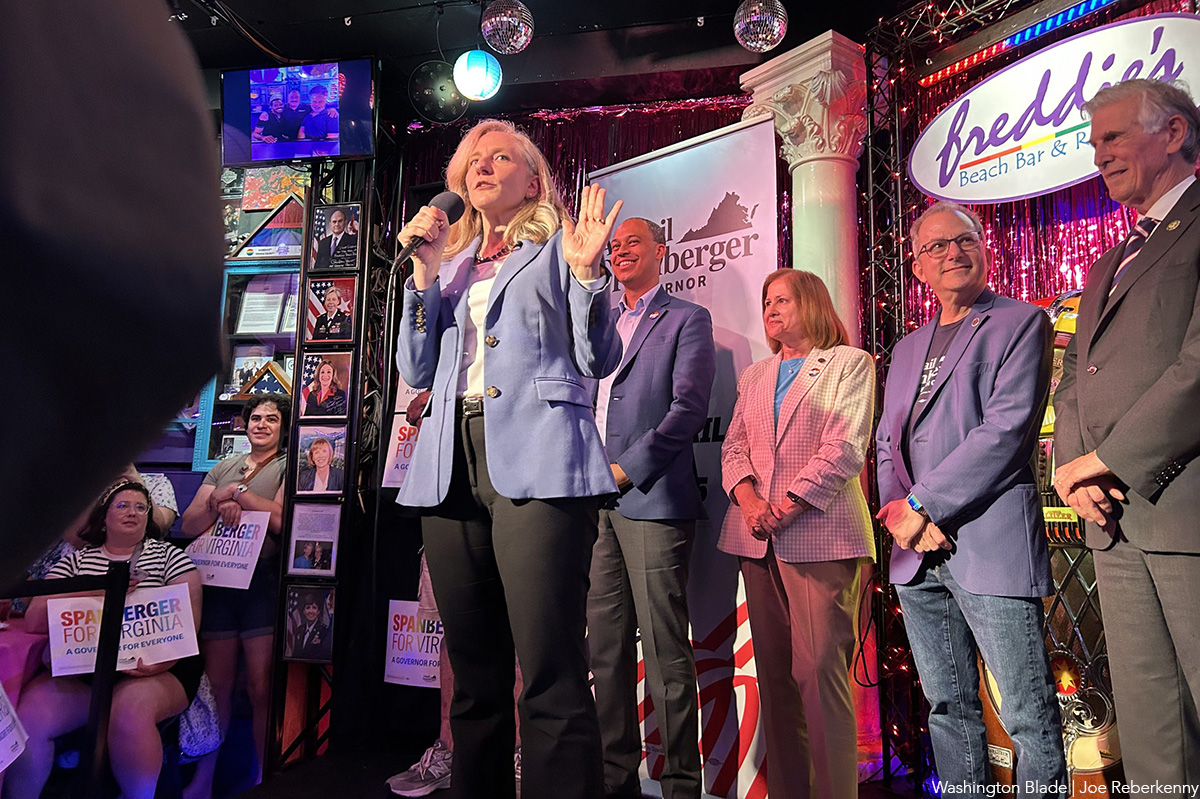
With the general election heating up and LGBTQ rights under increasing threat nationwide, Virginia gubernatorial candidate Abigail Spanberger brought her “Span Virginia Bus Tour” to Arlington’s Freddie’s Beach Bar for a campaign stop filled with cheers, policy pledges, and community spirit.
Spanberger, who served three terms in the U.S. House of Representatives from 2019 through early 2025 for Virginia’s 7th Congressional District, also served as a federal law enforcement officer specializing in narcotics and money laundering cases, and as a CIA case officer working on counterterrorism and nuclear counterproliferation.
Spanberger is running against Republican nominee Winsome Earle-Sears, the current lieutenant governor of Virginia, who said she was “morally opposed” to a bill protecting marriage equality in the commonwealth.
She was joined by other Democratic candidates and supporters: lieutenant gubernatorial candidate Ghazala Hashmi, attorney general candidate Jay Jones, Virginia state Sen. Adam Ebbin (D-Alexandria), and Congressman Don Beyer.
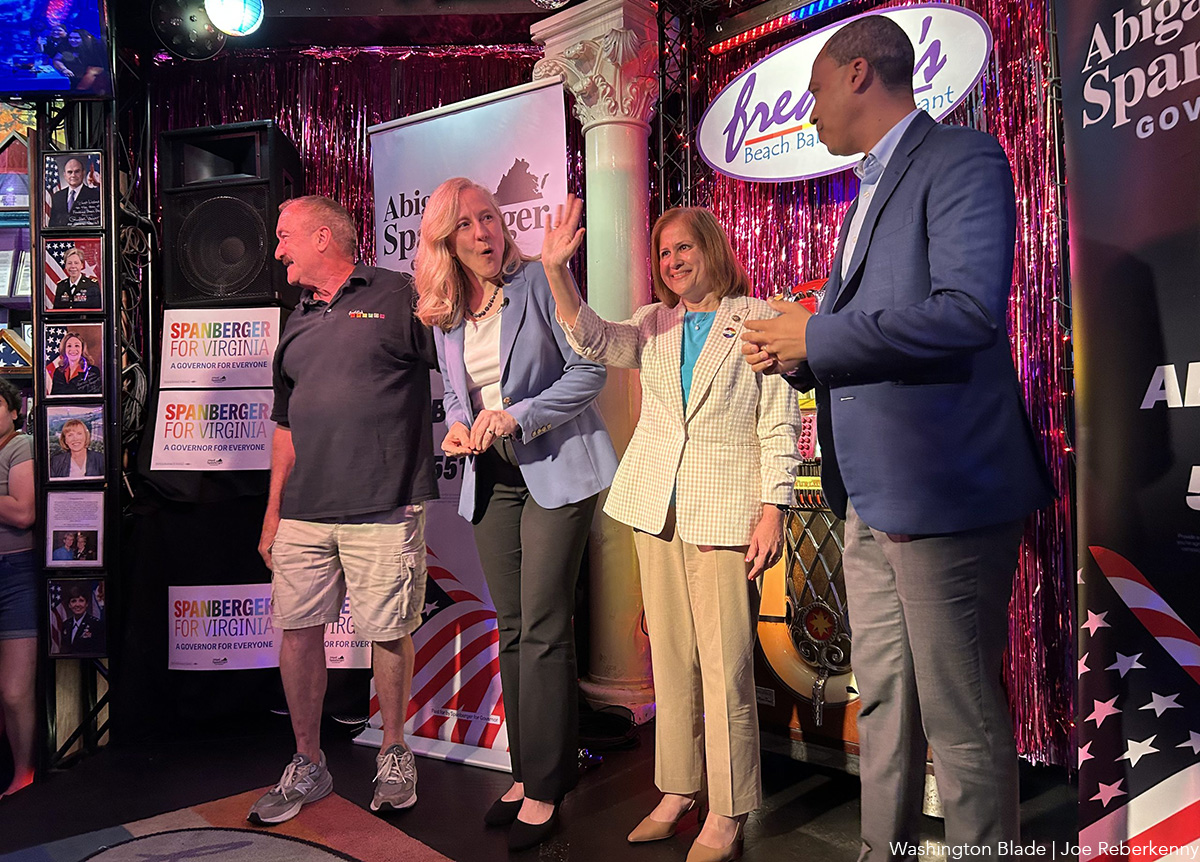
Freddie’s was packed wall-to-wall with supporters, many of whom wore “Spanberger for Virginia” shirts in the progressive Pride flag colors. In her speech, she made it clear that LGBTQ Virginians’ rights are on the ballot this year.
“I’m so excited to be here, and I am so grateful to the entire staff of Freddy’s for letting us overtake this incredible venue that is not just an awesome place to come together in community, but is a symbol to so many people of joy, of happiness, of community and of celebrating our friends and our neighbors,” Spanberger told the packed restaurant. “It is exciting to be here, and particularly during this Pride month, and particularly as we reflect on the 10-year anniversary of Obergefell and the reality that we still have so much work to do.”
“The reality is there are so many people who still would be inclined to take us backwards,” she said. “In this moment when we see attacks on people’s rights, on people’s humanity, on Virginia, on our economy, on research, on public education, on food security, on health care, on Virginians, on their jobs, on public service and on people — it can get heavy.”
“What it does for me is it makes me want to double down, because once upon a time, when I was talking to my mother about some horror show or sequence of activities coming out of a particular administration, she did not really have the patience to listen to me and said ‘Abigail, let your rage fuel you’ — and the conversation was over. And so I reflect on that, because, in fact, every day there is so much fuel to be had in this world and in this moment.”
One of the points Spanberger continued to emphasize was the importance of steadfast state government officials following the election of President Donald Trump, which has led to rollbacks of LGBTQ and bodily autonomy rights as a result of the conservative-majority U.S. Supreme Court.
“What the past few years have shown us is that a Supreme Court decision, no matter how many years we have celebrated its existence, does not protect us in the long term. And so as governor, I will work to make sure that every protection we can put in place for the dignity, the value, and the equal rights of all Virginians is a priority.”
During her speech, Spanberger highlighted several of the key values driving her campaign — protecting reproductive freedom and human rights, lowering healthcare costs, safeguarding Virginia’s environment, and ensuring that public education is affordable, accessible, and rooted in truth, not politics.
Spanberger went as far as to say that she wants to amend the state’s constitution to remove Section 15-A. “The reality is that in Virginia, we still have a ban in our state constitution on marriage equality. It is of the utmost urgency that we move forward with our constitutional amendment.”
“We will work to ensure that that terrible constitutional amendment, that was put in years ago, is taken out and updated and ensuring that Virginia is reflective in our most essential documents of who we are as a commonwealth, which is an accepting place that celebrates the vibrancy of every single person and recognizes that all Virginians have a place, both in that constitution and in law,” she added.
Following the event, two supporters spoke to the Washington Blade about why they had come out to support Spanberger.
“I came out because I needed to show support for this ticket, because it has been a particularly rough week, but a long few years for our rights in this country, in this state, with this governor, and it’s — we need to flip it around, because queer people need protection,” said Samantha Perez, who lives in Ballston. “Trans people need protection. Trans kids need protection. And it’s not gonna happen with who’s in Richmond right now, and we just need to get it turned around.”
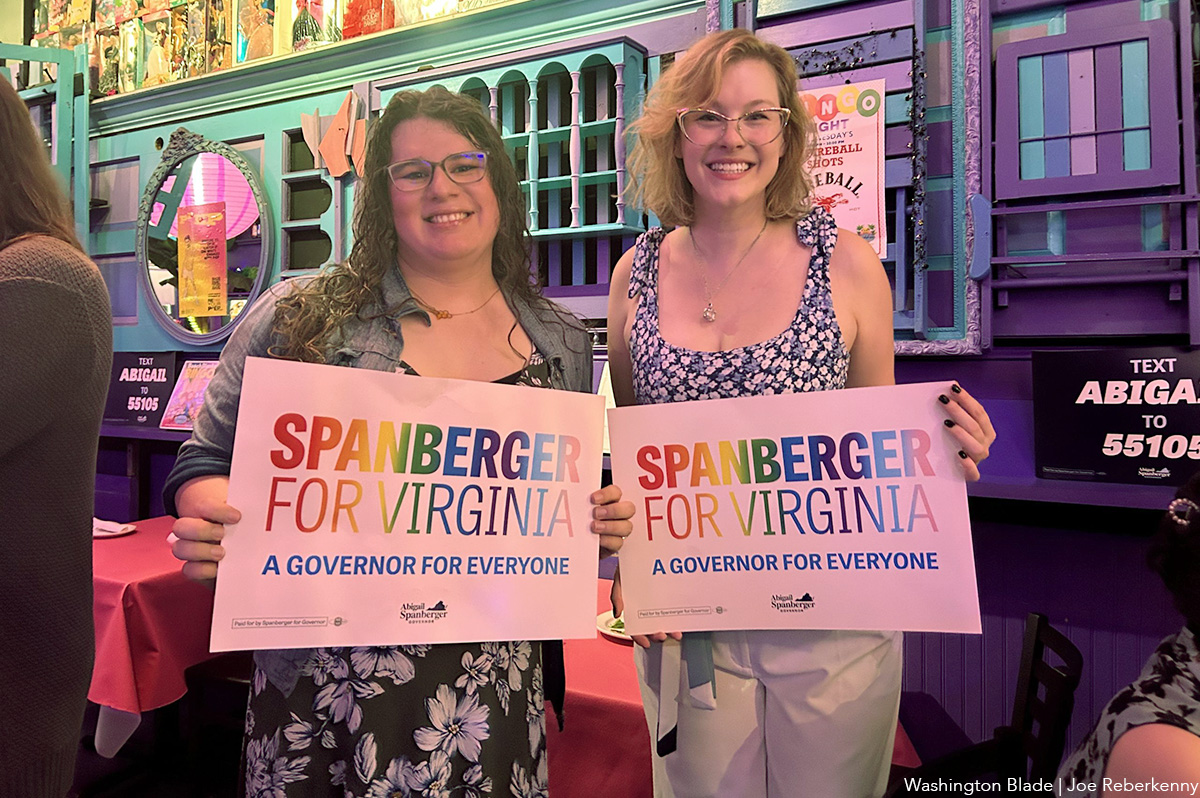
“The whole neighborhood’s here. All our friends are here,” said Annie Styles of Pentagon City. “It means the world to me to take care of each other. That’s what a good community does. That’s not what we’ve had with the Republicans here or across the nation for a really long time. It’s time to show that care. It’s time to make sure that good people are in a position to do good things.”
District of Columbia
Activists protest outside Hungarian Embassy in DC
Budapest Pride scheduled to take place Saturday, despite ban

More than two dozen activists gathered in front of the Hungarian Embassy in D.C. on Friday to protest the country’s ban on Budapest Pride and other LGBTQ-specific events.
Amnesty International USA Executive Director Paul O’Brien read a letter that Dávid Vig, executive director of Amnesty International Hungary, wrote.
“For 30 years Budapest Pride has been a celebration of hope, courage, and love,” said Vig in the letter that O’Brien read. “Each march through the streets of Budapest has been a powerful testament to the resilience of those who dare to demand equality, but a new law threatens to erase Pride and silence everyone who demands equal rights for LGBTI people.”
“The Hungarian government’s relentless campaign against LGBTI rights represents a worrying trend that can spread normalizing division and hatred,” added Vig. “Thank you for standing with us when we refuse to be intimidated.”
Council for Global Equality Chair Mark Bromley and two of his colleagues — Stephen Leonelli and Keifer Buckingham — also spoke. Health GAP Executive Director Asia Russell and Chloe Schwenke, a political appointee in the Obama-Biden administration who worked for the U.S. Agency for International Development, and Planned Parenthood staffers are among those who attended the protest.
(Washington Blade video by Michael K. Lavers)
Hungarian lawmakers in March passed a bill that bans Pride events and allow authorities to use facial recognition technology to identify those who participate in them. MPs in April amended the Hungarian constitution to ban public LGBTQ events.
Budapest Pride is scheduled to take place on Saturday, despite the ban. Hundreds of European lawmakers are expected to participate.
“Sending strength to the patriotic Hungarians marching tomorrow to advance human dignity and fundamental rights in a country they love,” said David Pressman, the gay former U.S. Ambassador to Hungary, on Friday on social media.
Sending strength to the patriotic Hungarians marching tomorrow to advance human dignity and fundamental rights in a country they love. Szabadság és szerelem. My past remarks on Budapest Pride: https://t.co/y1QhA9QouA
— David Pressman (@AmbPressman) June 27, 2025
-

 U.S. Supreme Court4 days ago
U.S. Supreme Court4 days agoSupreme Court upholds ACA rule that makes PrEP, other preventative care free
-

 U.S. Supreme Court4 days ago
U.S. Supreme Court4 days agoSupreme Court rules parents must have option to opt children out of LGBTQ-specific lessons
-

 National5 days ago
National5 days agoEvan Wolfson on the 10-year legacy of marriage equality
-

 Congress5 days ago
Congress5 days agoSenate parliamentarian orders removal of gender-affirming care ban from GOP reconciliation bill

